Essay: Causes and Effects of Alcoholism in the Millennial Generation
VerifiedAdded on 2022/08/27
|5
|1147
|20
Essay
AI Summary
This essay delves into the multifaceted issue of alcoholism within the millennial generation, examining the various factors that contribute to alcohol abuse. It explores psychological influences like stress and anxiety, social pressures, and genetic predispositions that make millennials susceptible to alcohol use disorder. The essay further analyzes the detrimental effects of alcoholism, including severe health consequences like liver disease, increased accident risks, and financial instability. Drawing on research from various sources, the essay highlights the current situation in the United States, emphasizing the high rates of alcohol consumption among millennials and the associated increase in treatment needs. The conclusion underscores the importance of understanding the causes and effects of alcoholism to address this critical public health concern effectively.
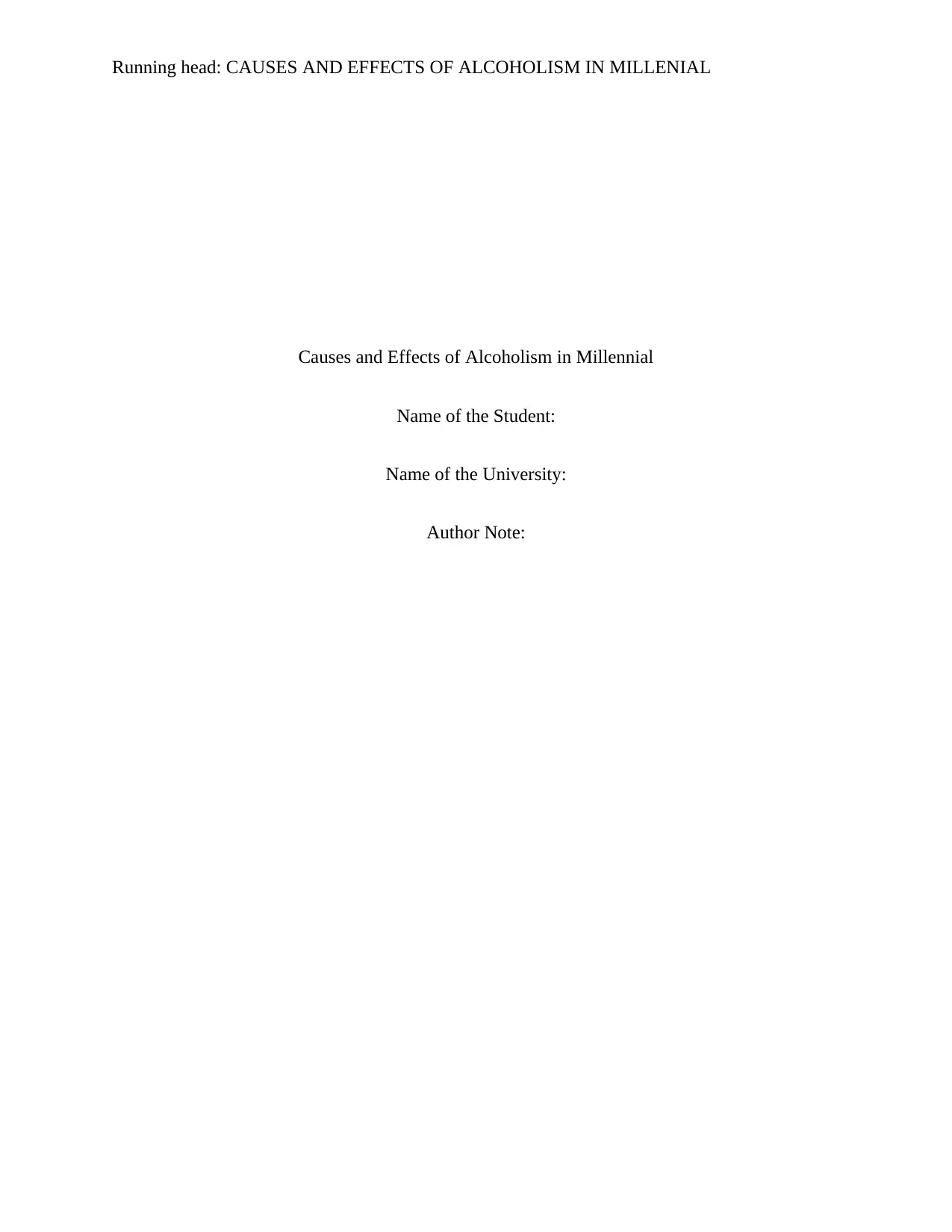
Running head: CAUSES AND EFFECTS OF ALCOHOLISM IN MILLENIAL
Causes and Effects of Alcoholism in Millennial
Name of the Student:
Name of the University:
Author Note:
Causes and Effects of Alcoholism in Millennial
Name of the Student:
Name of the University:
Author Note:
Paraphrase This Document
Need a fresh take? Get an instant paraphrase of this document with our AI Paraphraser
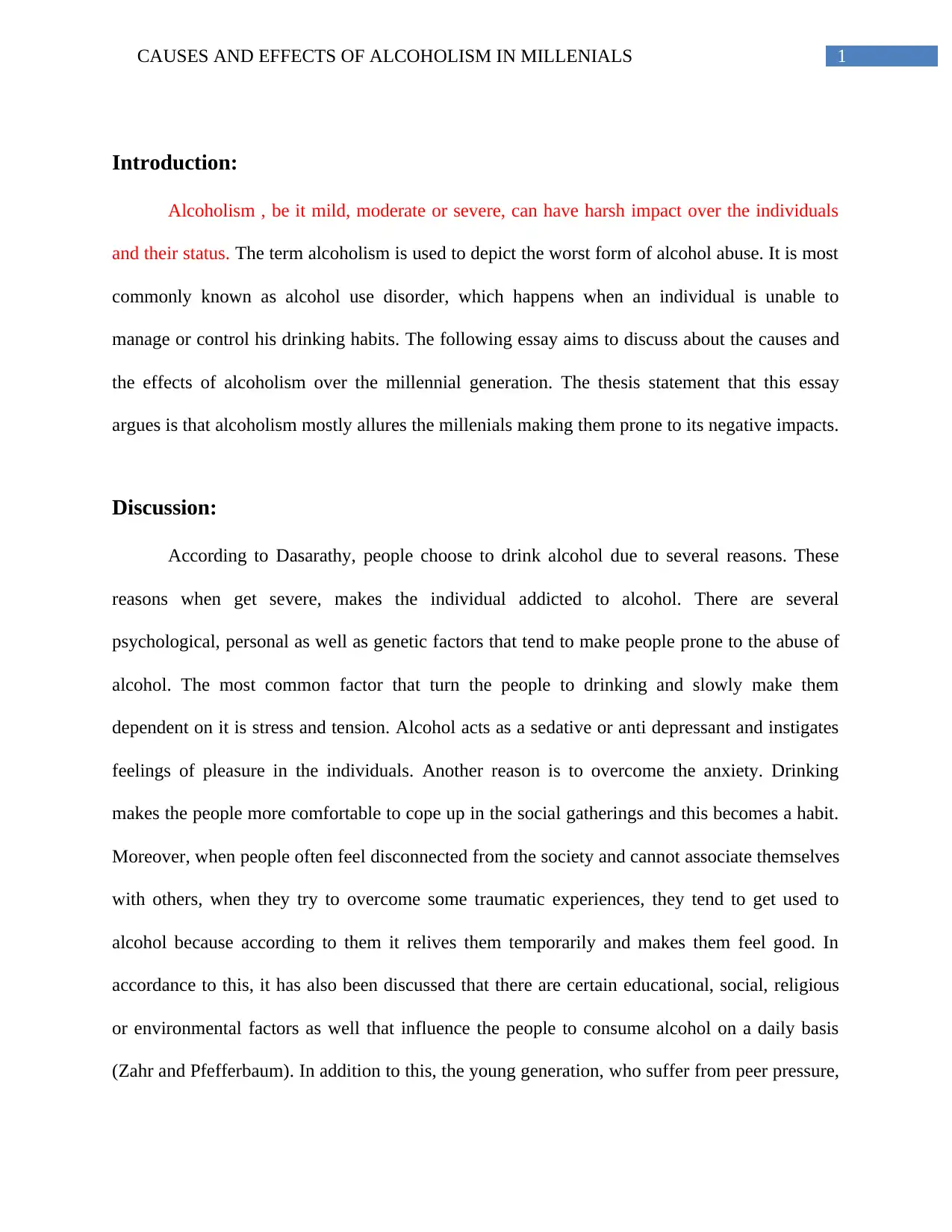
1CAUSES AND EFFECTS OF ALCOHOLISM IN MILLENIALS
Introduction:
Alcoholism , be it mild, moderate or severe, can have harsh impact over the individuals
and their status. The term alcoholism is used to depict the worst form of alcohol abuse. It is most
commonly known as alcohol use disorder, which happens when an individual is unable to
manage or control his drinking habits. The following essay aims to discuss about the causes and
the effects of alcoholism over the millennial generation. The thesis statement that this essay
argues is that alcoholism mostly allures the millenials making them prone to its negative impacts.
Discussion:
According to Dasarathy, people choose to drink alcohol due to several reasons. These
reasons when get severe, makes the individual addicted to alcohol. There are several
psychological, personal as well as genetic factors that tend to make people prone to the abuse of
alcohol. The most common factor that turn the people to drinking and slowly make them
dependent on it is stress and tension. Alcohol acts as a sedative or anti depressant and instigates
feelings of pleasure in the individuals. Another reason is to overcome the anxiety. Drinking
makes the people more comfortable to cope up in the social gatherings and this becomes a habit.
Moreover, when people often feel disconnected from the society and cannot associate themselves
with others, when they try to overcome some traumatic experiences, they tend to get used to
alcohol because according to them it relives them temporarily and makes them feel good. In
accordance to this, it has also been discussed that there are certain educational, social, religious
or environmental factors as well that influence the people to consume alcohol on a daily basis
(Zahr and Pfefferbaum). In addition to this, the young generation, who suffer from peer pressure,
Introduction:
Alcoholism , be it mild, moderate or severe, can have harsh impact over the individuals
and their status. The term alcoholism is used to depict the worst form of alcohol abuse. It is most
commonly known as alcohol use disorder, which happens when an individual is unable to
manage or control his drinking habits. The following essay aims to discuss about the causes and
the effects of alcoholism over the millennial generation. The thesis statement that this essay
argues is that alcoholism mostly allures the millenials making them prone to its negative impacts.
Discussion:
According to Dasarathy, people choose to drink alcohol due to several reasons. These
reasons when get severe, makes the individual addicted to alcohol. There are several
psychological, personal as well as genetic factors that tend to make people prone to the abuse of
alcohol. The most common factor that turn the people to drinking and slowly make them
dependent on it is stress and tension. Alcohol acts as a sedative or anti depressant and instigates
feelings of pleasure in the individuals. Another reason is to overcome the anxiety. Drinking
makes the people more comfortable to cope up in the social gatherings and this becomes a habit.
Moreover, when people often feel disconnected from the society and cannot associate themselves
with others, when they try to overcome some traumatic experiences, they tend to get used to
alcohol because according to them it relives them temporarily and makes them feel good. In
accordance to this, it has also been discussed that there are certain educational, social, religious
or environmental factors as well that influence the people to consume alcohol on a daily basis
(Zahr and Pfefferbaum). In addition to this, the young generation, who suffer from peer pressure,
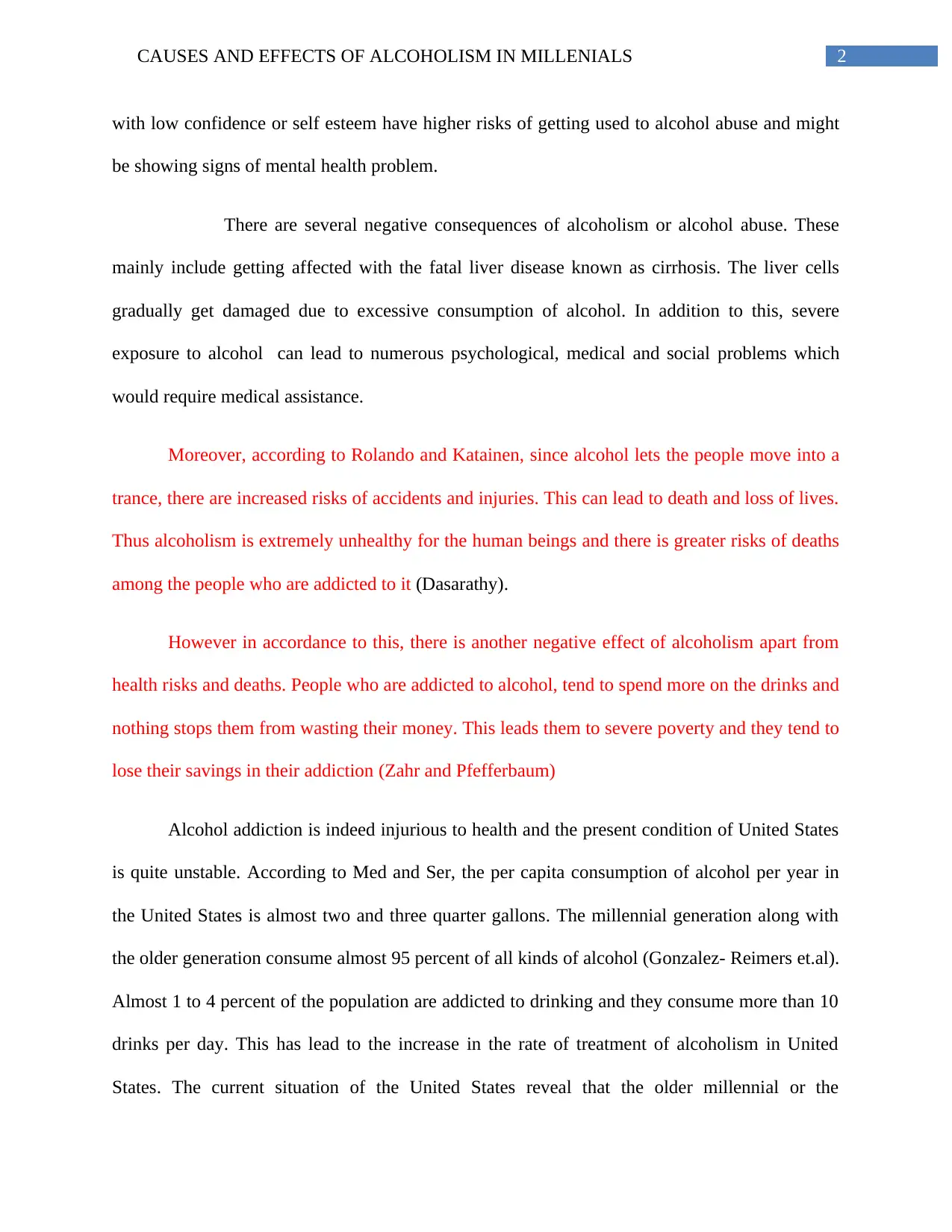
2CAUSES AND EFFECTS OF ALCOHOLISM IN MILLENIALS
with low confidence or self esteem have higher risks of getting used to alcohol abuse and might
be showing signs of mental health problem.
There are several negative consequences of alcoholism or alcohol abuse. These
mainly include getting affected with the fatal liver disease known as cirrhosis. The liver cells
gradually get damaged due to excessive consumption of alcohol. In addition to this, severe
exposure to alcohol can lead to numerous psychological, medical and social problems which
would require medical assistance.
Moreover, according to Rolando and Katainen, since alcohol lets the people move into a
trance, there are increased risks of accidents and injuries. This can lead to death and loss of lives.
Thus alcoholism is extremely unhealthy for the human beings and there is greater risks of deaths
among the people who are addicted to it (Dasarathy).
However in accordance to this, there is another negative effect of alcoholism apart from
health risks and deaths. People who are addicted to alcohol, tend to spend more on the drinks and
nothing stops them from wasting their money. This leads them to severe poverty and they tend to
lose their savings in their addiction (Zahr and Pfefferbaum)
Alcohol addiction is indeed injurious to health and the present condition of United States
is quite unstable. According to Med and Ser, the per capita consumption of alcohol per year in
the United States is almost two and three quarter gallons. The millennial generation along with
the older generation consume almost 95 percent of all kinds of alcohol (Gonzalez- Reimers et.al).
Almost 1 to 4 percent of the population are addicted to drinking and they consume more than 10
drinks per day. This has lead to the increase in the rate of treatment of alcoholism in United
States. The current situation of the United States reveal that the older millennial or the
with low confidence or self esteem have higher risks of getting used to alcohol abuse and might
be showing signs of mental health problem.
There are several negative consequences of alcoholism or alcohol abuse. These
mainly include getting affected with the fatal liver disease known as cirrhosis. The liver cells
gradually get damaged due to excessive consumption of alcohol. In addition to this, severe
exposure to alcohol can lead to numerous psychological, medical and social problems which
would require medical assistance.
Moreover, according to Rolando and Katainen, since alcohol lets the people move into a
trance, there are increased risks of accidents and injuries. This can lead to death and loss of lives.
Thus alcoholism is extremely unhealthy for the human beings and there is greater risks of deaths
among the people who are addicted to it (Dasarathy).
However in accordance to this, there is another negative effect of alcoholism apart from
health risks and deaths. People who are addicted to alcohol, tend to spend more on the drinks and
nothing stops them from wasting their money. This leads them to severe poverty and they tend to
lose their savings in their addiction (Zahr and Pfefferbaum)
Alcohol addiction is indeed injurious to health and the present condition of United States
is quite unstable. According to Med and Ser, the per capita consumption of alcohol per year in
the United States is almost two and three quarter gallons. The millennial generation along with
the older generation consume almost 95 percent of all kinds of alcohol (Gonzalez- Reimers et.al).
Almost 1 to 4 percent of the population are addicted to drinking and they consume more than 10
drinks per day. This has lead to the increase in the rate of treatment of alcoholism in United
States. The current situation of the United States reveal that the older millennial or the
⊘ This is a preview!⊘
Do you want full access?
Subscribe today to unlock all pages.

Trusted by 1+ million students worldwide
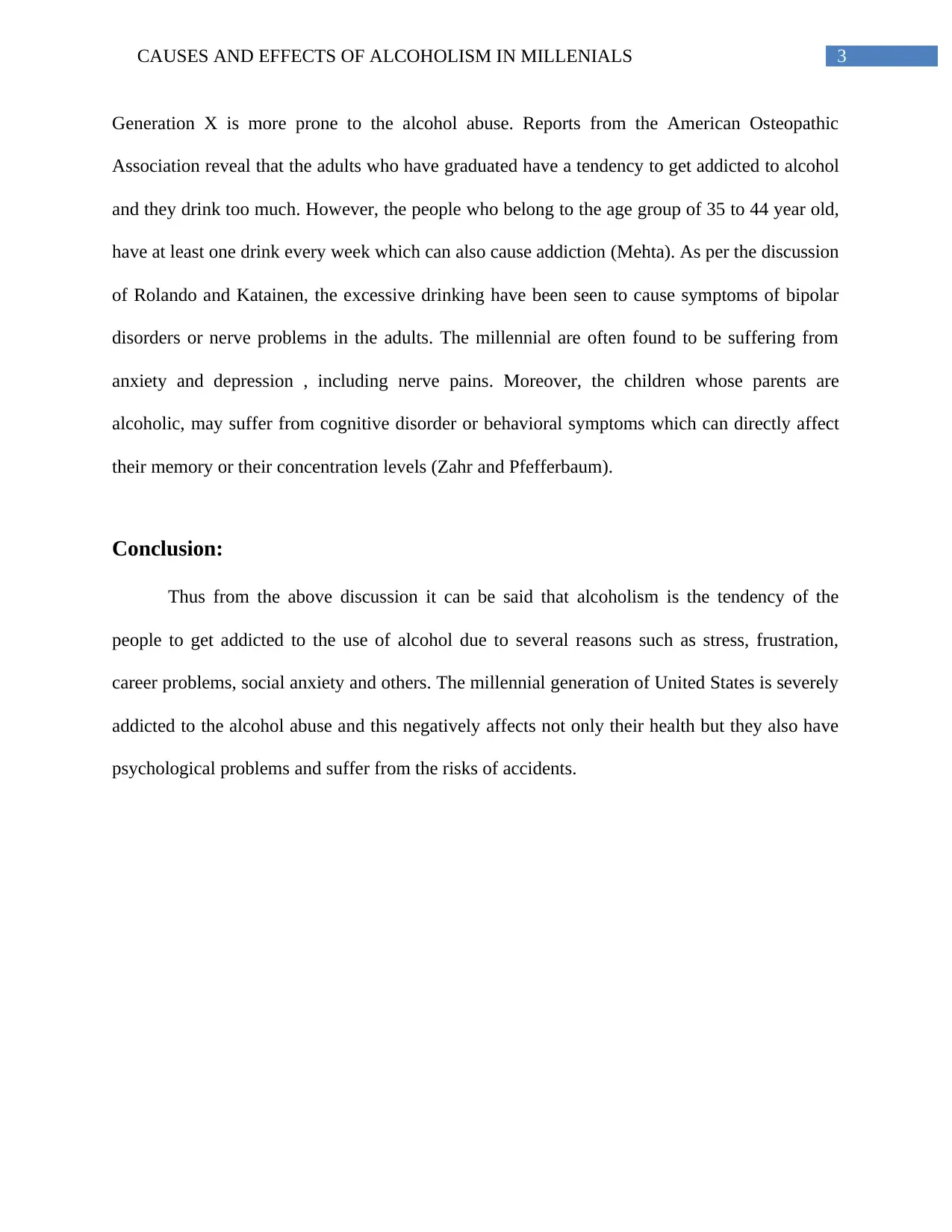
3CAUSES AND EFFECTS OF ALCOHOLISM IN MILLENIALS
Generation X is more prone to the alcohol abuse. Reports from the American Osteopathic
Association reveal that the adults who have graduated have a tendency to get addicted to alcohol
and they drink too much. However, the people who belong to the age group of 35 to 44 year old,
have at least one drink every week which can also cause addiction (Mehta). As per the discussion
of Rolando and Katainen, the excessive drinking have been seen to cause symptoms of bipolar
disorders or nerve problems in the adults. The millennial are often found to be suffering from
anxiety and depression , including nerve pains. Moreover, the children whose parents are
alcoholic, may suffer from cognitive disorder or behavioral symptoms which can directly affect
their memory or their concentration levels (Zahr and Pfefferbaum).
Conclusion:
Thus from the above discussion it can be said that alcoholism is the tendency of the
people to get addicted to the use of alcohol due to several reasons such as stress, frustration,
career problems, social anxiety and others. The millennial generation of United States is severely
addicted to the alcohol abuse and this negatively affects not only their health but they also have
psychological problems and suffer from the risks of accidents.
Generation X is more prone to the alcohol abuse. Reports from the American Osteopathic
Association reveal that the adults who have graduated have a tendency to get addicted to alcohol
and they drink too much. However, the people who belong to the age group of 35 to 44 year old,
have at least one drink every week which can also cause addiction (Mehta). As per the discussion
of Rolando and Katainen, the excessive drinking have been seen to cause symptoms of bipolar
disorders or nerve problems in the adults. The millennial are often found to be suffering from
anxiety and depression , including nerve pains. Moreover, the children whose parents are
alcoholic, may suffer from cognitive disorder or behavioral symptoms which can directly affect
their memory or their concentration levels (Zahr and Pfefferbaum).
Conclusion:
Thus from the above discussion it can be said that alcoholism is the tendency of the
people to get addicted to the use of alcohol due to several reasons such as stress, frustration,
career problems, social anxiety and others. The millennial generation of United States is severely
addicted to the alcohol abuse and this negatively affects not only their health but they also have
psychological problems and suffer from the risks of accidents.
Paraphrase This Document
Need a fresh take? Get an instant paraphrase of this document with our AI Paraphraser
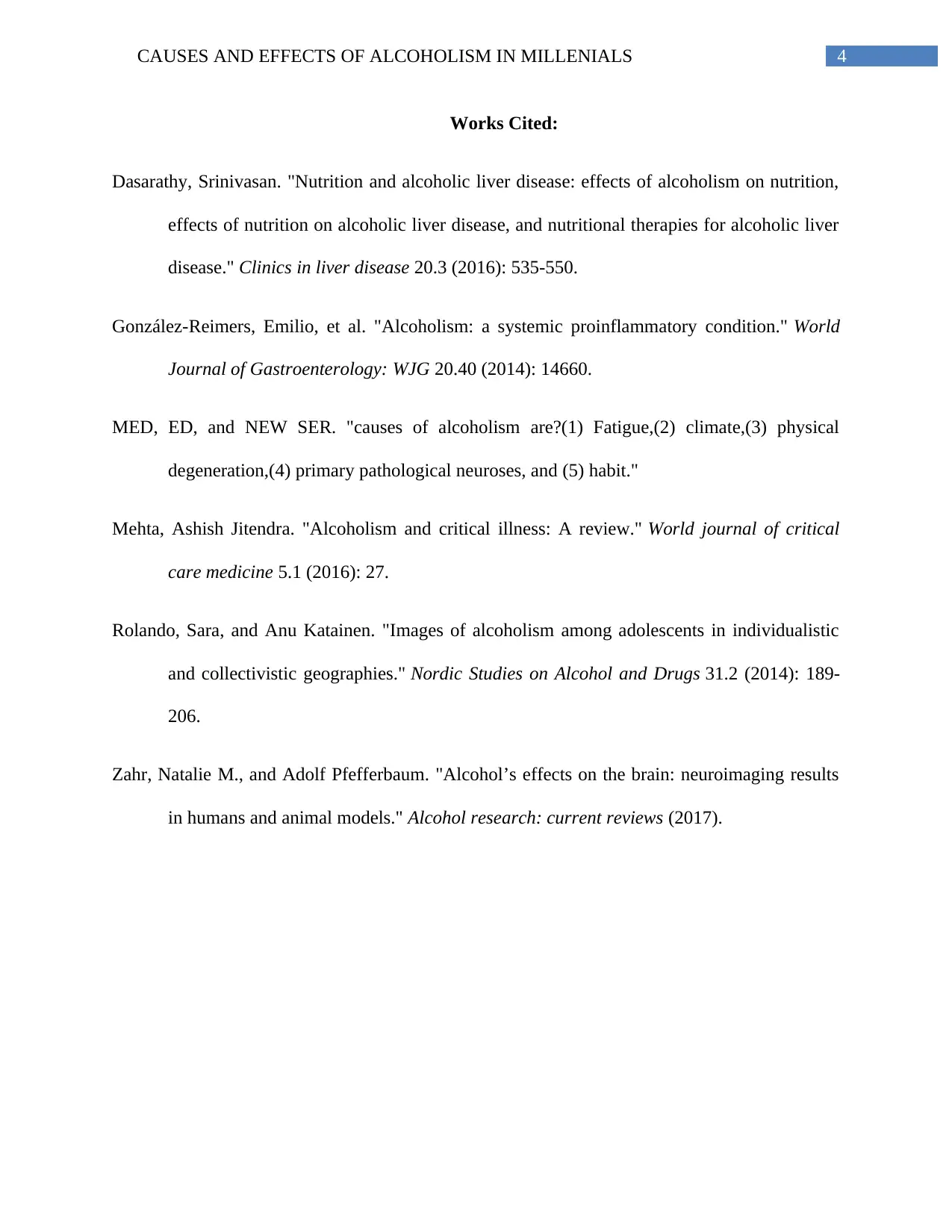
4CAUSES AND EFFECTS OF ALCOHOLISM IN MILLENIALS
Works Cited:
Dasarathy, Srinivasan. "Nutrition and alcoholic liver disease: effects of alcoholism on nutrition,
effects of nutrition on alcoholic liver disease, and nutritional therapies for alcoholic liver
disease." Clinics in liver disease 20.3 (2016): 535-550.
González-Reimers, Emilio, et al. "Alcoholism: a systemic proinflammatory condition." World
Journal of Gastroenterology: WJG 20.40 (2014): 14660.
MED, ED, and NEW SER. "causes of alcoholism are?(1) Fatigue,(2) climate,(3) physical
degeneration,(4) primary pathological neuroses, and (5) habit."
Mehta, Ashish Jitendra. "Alcoholism and critical illness: A review." World journal of critical
care medicine 5.1 (2016): 27.
Rolando, Sara, and Anu Katainen. "Images of alcoholism among adolescents in individualistic
and collectivistic geographies." Nordic Studies on Alcohol and Drugs 31.2 (2014): 189-
206.
Zahr, Natalie M., and Adolf Pfefferbaum. "Alcohol’s effects on the brain: neuroimaging results
in humans and animal models." Alcohol research: current reviews (2017).
Works Cited:
Dasarathy, Srinivasan. "Nutrition and alcoholic liver disease: effects of alcoholism on nutrition,
effects of nutrition on alcoholic liver disease, and nutritional therapies for alcoholic liver
disease." Clinics in liver disease 20.3 (2016): 535-550.
González-Reimers, Emilio, et al. "Alcoholism: a systemic proinflammatory condition." World
Journal of Gastroenterology: WJG 20.40 (2014): 14660.
MED, ED, and NEW SER. "causes of alcoholism are?(1) Fatigue,(2) climate,(3) physical
degeneration,(4) primary pathological neuroses, and (5) habit."
Mehta, Ashish Jitendra. "Alcoholism and critical illness: A review." World journal of critical
care medicine 5.1 (2016): 27.
Rolando, Sara, and Anu Katainen. "Images of alcoholism among adolescents in individualistic
and collectivistic geographies." Nordic Studies on Alcohol and Drugs 31.2 (2014): 189-
206.
Zahr, Natalie M., and Adolf Pfefferbaum. "Alcohol’s effects on the brain: neuroimaging results
in humans and animal models." Alcohol research: current reviews (2017).
1 out of 5
Related Documents
Your All-in-One AI-Powered Toolkit for Academic Success.
+13062052269
info@desklib.com
Available 24*7 on WhatsApp / Email
![[object Object]](/_next/static/media/star-bottom.7253800d.svg)
Unlock your academic potential
Copyright © 2020–2025 A2Z Services. All Rights Reserved. Developed and managed by ZUCOL.





